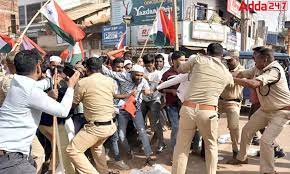Ministry of Home Affairs bans PFI and its associates for five years

Ministry of Home Affairs bans PFI and its associates: Days after law enforcement agencies launched a nationwide crackdown against the Popular Front of India, and the Centre Wednesday banned the PFI and its affiliates for five years.
Invoking the Unlawful Activities (Prevention) Act to effect the ban, the Ministry of Home Affairs said the PFI and its affiliates are linked to terror groups like the ISIS, propagate “anti-national sentiments… radicalize a particular section of society with the intention to create disaffection” and constitute a “major threat to internal security of the country”.
Ministry of Home Affairs Bans PFI and its Associates: Key Points
- Centre also mentioned, they also promote “anti-national sentiments… radicalise a particular section of society with the intention of creating disaffection.”
- The MHA designated the Popular Front of India (PFI) as a “unlawful association” along with “its associates or affiliates or fronts including Rehab India Foundation (RIF), Campus Front of India (CFI), All India Imams Council (AIIC), National Confederation of Human Rights Organization (NCHRO), National Women’s Front, Junior Front, Empower India Foundation, and Rehab Foundation, Kerala,” claiming that it was “necessary to curb the nefarious activities” of the organisation.
- The SDPI, the PFI’s political wing, was excluded from the ban.
- After the ban, the Popular Front of India (PFI) made an announcement that it was breaking apart.
- The PFI and its affiliates’ designation as “unlawful associations” gives law enforcement organisations the right to detain PFI members, freeze their accounts, and seize their assets.
Section 10 of the UAPA:
According to Section 10 of the UAPA, membership in a banned organisation is illegal. According to the Section 10 of the UAPA, belonging to an organisation that is prohibited carries a minimum two-year sentence and, in some cases, a life sentence or even the death penalty.
According to Section 10, anyone who “is and continues to be a member of such association; participates in such association’s meetings; contributes to, receives, or solicits any contribution for the benefit of such association; or in any other manner assists the operations of such association shall be punishable with imprisonment for a term which may extend to two years, and shall also be liable to fine.” Anyone who supports the goals of the prohibited organisation is likewise subject to it. Section 7 of the UAPA’s grants the government the authority to “prohibit use of funds” by an “illegal group.”
Power of the Central Government as per the law:
- According to the law, if the Central Government is satisfied following an investigation that “any person has custody of any moneys, securities, or credits which are being used or are intended to be used for the purpose of the unlawful association, the Central Government may, by order in writing, prohibit such person from paying, delivering, transferring, or otherwise dealing in any manner.”
- Centre has the power as per the law to ban the person if found with such moneys, securities, or credits or with any other moneys, securities, or credits.
- It also grant law enforcement organisations the authority to conduct searches of these organisations’ offices and inspect their financial records.
- The Center is authorised to “notify any place which in its opinion is used for the purpose of such unlawful organisation” under Section 8 of the UAPA.
- The term “place” in this context refers to a home, a building, or a portion of one, as well as to a tent or a vessel.
Popular Front of India: About
- The Popular Front of India (PFI), is an Indian Muslim political organisation.
- It is an extreme and exclusivist brand of Muslim minority politics is practised.
- It was created to oppose Hindutva groups, and on September 28, 2022, the Indian Ministry of Home Affairs imposed a 5-year ban on it under the Unlawful Activities (Prevention) Act (UAPA).
When PFI is established?
- Popular Front of India (PFI) was established in 2006 as a result of the union of the National Development Front (NDF) and the Karnataka Forum for Dignity (KFD).
- As a “neo-social movement committed to empowering people to promote justice, freedom, and security,” the organisation identified itself.
What does the Popular Front of India (PFI) do?
- It promotes accommodations for Muslims. The group staged demonstrations in 2012 in opposition to the purported detention of innocent people under the UAPA statute.
- The Indian government has frequently accused PFI of taking part in anti-social and anti-national activities.
- The Keralan government asserted in 2012 that the group was a revival of the Indian Mujahideen affiliate Students Islamic Movement of India (SIMI), a terrorist organisation that had been outlawed.
- In some areas of Kerala and Karnataka, PFI and the Rashtriya Swayamsevak Sangh (RSS) have frequently engaged in violent confrontations.
- Indian authorities have discovered activists in possession of deadly weapons such as explosives, ammunition, and swords.
- The Popular Front of India has been accused of having ties to terrorist groups like the Taliban and Al-Qaeda on a number of occasions.
- The Chairman of PFI is OMA Abdul Salam and the Vice Chairman of Popular Front of India (PFI) is E.M Abdul Rahiman.